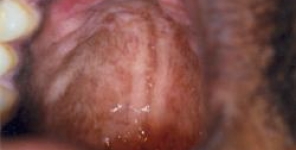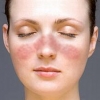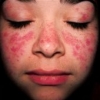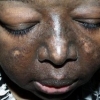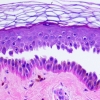Esperienza con l'uso dell'idrossiclorochina per il trattamento del lupus eritematoso
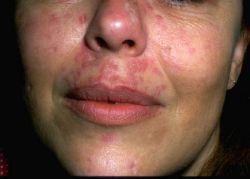 L'idrossiclorochina (HCQ) è generalmente utilizzata per il trattamento del lupus eritematoso sistemico (SLE) nei paesi occidentali. Tuttavia, la retinopatia da clorochina è diventata un problema in Giappone, e da allora la clorochina non è mai più stata utilizzata. Fino ad ora l'HCQ rimane non approvata.
L'idrossiclorochina (HCQ) è generalmente utilizzata per il trattamento del lupus eritematoso sistemico (SLE) nei paesi occidentali. Tuttavia, la retinopatia da clorochina è diventata un problema in Giappone, e da allora la clorochina non è mai più stata utilizzata. Fino ad ora l'HCQ rimane non approvata.
Pertanto, è stato organizzato un Gruppo di Studio Giapponese sull'Idrossiclorochina, e le attività hanno iniziato ad approvare l'HCQ anche per il Giappone. In questo studio, abbiamo esaminato l'efficacia della HCQ contro le manifestazioni cutanee del lupus eritematoso.
Sono stati inclusi nello studio sette pazienti, tutti di sesso femminile, di cui quattro con SLE (tipo di lesione cutanea: lupus eritematoso discoide [DLE] in tre pazienti, lupus eritematoso cutaneo subacuto in un paziente e lupus eritematoso profondo in un altro), due pazienti con lupus eritematoso cutaneo (entrambi DLE), ed un paziente con una combinazione di SLE e dermatomiosite. L'HCQ è stata efficace in tre pazienti e inefficace negli altri due.
Non abbiamo potuto valutare l'efficacia di HCQ negli altri due pazienti. Non ci sono stati effetti negativi per nessun paziente. Si è ottenuta un'efficacia contro la telangiectasia e l'eritema. L'HCQ è un trattamento efficace e sicuro anche per i pazienti Giapponesi, e si spera che il suo uso possa essere approvato molto presto anche in Giappone.
Storia della pubblicazione:
Titolo: Experience with the use of hydroxychloroquine for the treatment of lupus erythematosus
Rivista: The Journal of Dermatology. doi: 10.1111/1346-8138.12005
Autori: Yoko Momose, Satoru Arai, Hikaru Eto, Mitsumasa Kishimoto, Masato Okada
Affiliazioni: Department of Dermatology, St Luke's International Hospital, Tokyo, Japan
Department of Allergy and Rheumatology, St Luke's International Hospital, Tokyo, Japan
Abstract:
Hydroxychloroquine (HCQ) is generally used to treat systemic lupus erythematosus (SLE) in Western countries. However, chloroquine retinopathy became a problem in Japan, and chloroquine has never been used since then. Even now HCQ remains non-approved. Therefore, the Japanese Hydroxychloroquine Study Group has been organized, and activities have started to have HCQ approved within Japan. In the present study, we investigated the effectiveness of HCQ against the skin manifestations of lupus erythematosus. There were seven patients, all female, and they consisted of four patients with SLE (skin lesion type: discoid lupus erythematosus [DLE] in three, subacute cutaneous lupus erythematosus in one and lupus erythematosus profundus in one), two patients with cutaneous lupus erythematosus (both DLE), and one patient with a combination of SLE and dermatomyositis. HCQ was effective in three patients and ineffective in the two patients. We could not judge the efficacy of HCQ in the other two patients. There were no adverse effects in any of the patients. Efficacy was exhibited against telangiectasia and erythema. HCQ is also an effective and safe treatment for Japanese patients, and it is hoped that it will be approved for use in Japan very soon.
